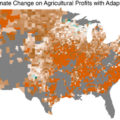Sowing seeds: How finance can support a just transition in UK agriculture
Policy publication by Brendan Curran, Nick Robins on 3 Jul 2023
This report examines social risks and opportunities for stakeholders affected by environmental transitions in UK food and agriculture and makes recommendations to financial institutions for how they can support a just transition in the sector.






